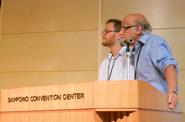
Associate Professor of Art History Stephen J. Goldberg and his son Ariel M. Cohen-Goldberg, assistant professor of psychology at Tufts University, presented a paper on Aug. 3 at the 34th Annual Conference of the Cognitive Science Society in Sapporo, Japan. “Constraint Interaction in the Analysis of Chinese Calligraphic Scripts” was part of a panel titled “Grammatical Approaches to Written and Graphical Communication.”
According to Goldberg, “the field of art history has traditionally treated its object of study – art, in its various physical manifestations – as a phenomenon “out in the world.” Yet, art, like language, is fundamentally a product of the human mind.” Goldberg and Cohen-Goldberg argued that the field of art history can benefit from a mentalist perspective where art is considered the product of artistic/esthetic cognition.
Exploring the possible application of Optimality Theory (OT) as a framework for the analysis of Chinese calligraphic inscriptions, Goldberg and Cohen-Goldberg provided a theoretical account of Chinese calligraphy that views calligraphic scripts (seal, clerical and standard scripts) as the product of a grammar that must simultaneously balance the needs of inscriptual well-formedness and legibility. Borrowing notions from work in theoretical phonology, they argued that calligraphic grammars consist of “markedness” constraints that assure that the calligraphic inscription possess script-typical qualities while “faithfulness” constraints ensure the recoverability of the underlying character. Utilizing this framework, they reported novel results concerning 1) the various types of scope that are active within a calligraphic script and 2) the formal relationships that exist between scripts.
